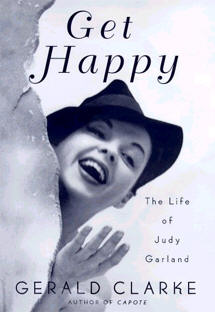 |


|
|
Get Happy: The Life of Judy Garland by Gerald Clarke; Random House; 510 pages; $29.95.
Most of all, it is Judy's backstage life that haunts our imaginations. How did such a gifted woman have such a destructive life? Behind the triumphs on the stage, screen and recording studio was an insecure little girl who was the constant victim of parents, producers, husbands, agents, drug addictions, suicide attempts and her own fragile psyche. Reading her life story, we are not amazed by the fact that Judy Garland died (of an unintended drug overdose) when she was "only" 47. What amazes us is that she managed to live that long. Since Garland's untimely death, she has been the subject of over 20 biographies, ranging from Gerold Frank's masterly Judy to daughter Lorna's recent memoirs. Do we really need another Judy book? Gerald Clarke, author of Capote, prove the skeptics wrong by writing Get Happy, a book that could very well replace Gerald Frank's book as the definitive Garland biography.
Indeed, if anyone could qualify as the villain of Get Happy it would be Ethel Gumm, a stage mother from hell who pushed her daughter to distraction and shamelessly lived off her successes while constantly denying her the love she needed. Equally monstrous is MGM chief Louis B. Mayer, a tyrant and a lech who groped Judy's breasts while calling her his "little hunchback" and who added diet pills to her pharmaceutical menu. Garland longed to be classically beautiful like the luscious Lana Turner, an inferiority complex that Turner encouraged by stealing Garland's boy friends. Clarke is not the only Garland biographer to write about father Frank Gumm's homosexuality, though he goes into greater detail about Gumm's penchant for teenage boys. Though Gumm was the great love of his daughter's life, he could or would not prevent his wife from abusing their daughter, and his early death kept him from helping his daughter materially or emotionally. He did however influence his daughter's taste in men. Throughout her life Garland would fall in love with gay or bisexual men, from early crush Tyrone Power to second husband Vincente Minnelli to fourth husband Mark Herron. Judy's discovery of Vincente in bed with another man led to her first suicide attempt. Herron was even worse: while married to Garland he was enjoying a simultaneous affair with Peter Allen, who was then married to Judy's older daughter Liza Minnelli. Though Garland herself was mostly heterosexual-- "drawn to men as iron is drawn to a magnet"--she occasionally had affairs with women, including one--Betty Asher--who secretly spied on her for MGM. By necessarily stressing the less savory aspects of Judy Garland's life, Clarke seems to discount her greatness as a singer and actor. Yet it was Garland's personal valleys that made her professional peaks so much greater. Writing about Judy's appeal to gay men--an often-discussed topic--Clarke noted that "homosexuals of that closeted era identified with Judy because they, too, were the objects of demeaning jokes and casual contempt . . . and they derived comfort and inspiration from her ability to survive similar assaults. As many times as she fell down, Judy always managed to pull herself up--and they hoped that they would do the same." Though, alas, Judy finally got to the point where she could no longer pull herself up, she left behind a body of work that continues to entertain and inspire us. Clarke knows this, which is why Get Happy is not an ironic title. |
 © 1997-2000 BEI
© 1997-2000 BEI
 Thirty years after Judy Garland's death (on the eve of Stonewall), she
remains a part of American pop culture. The Wizard of Oz, arguably Garland's
greatest film, is a fixture of American television; Garland CD's are bought
by listeners who were not even born when she died; and younger daughter Lorna
Luft tours the country singing her mother's songs.
Thirty years after Judy Garland's death (on the eve of Stonewall), she
remains a part of American pop culture. The Wizard of Oz, arguably Garland's
greatest film, is a fixture of American television; Garland CD's are bought
by listeners who were not even born when she died; and younger daughter Lorna
Luft tours the country singing her mother's songs.